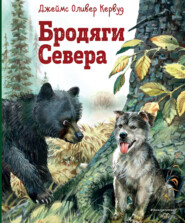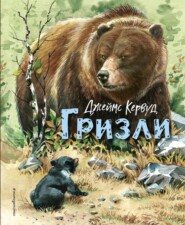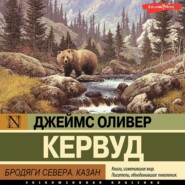По всем вопросам обращайтесь на: info@litportal.ru
(©) 2003-2024.
✖
The Country Beyond: A Romance of the Wilderness
Автор
Год написания книги
2017
Настройки чтения
Размер шрифта
Высота строк
Поля
He was gone. He hit straight north, making noise as he went, but once in the timber he swung southward, and plunged through the creek with Peter under his arm. Not until they had traveled a good half mile over the plain did Jolly Roger speak. Then he said, speaking directly at Peter,
"Cassidy thinks I'll sure hit for the North country again, Pied-Bot. But we're foolin' him. I've sort of planned on something like this happening, and right now we're hittin' for the tail-end of Cragg's Ridge where there's a mess of rock that the devil himself can hardly get into. We've got to do it, boy. We can't leave the girl – just now. We can't leave – her – "
Jolly Roger's voice choked. Then he paused for a moment, and bent over to put his hand on Peter.
"If it hadn't been for you, Peter – Cassidy would have got me – sure. And I'm wondering, Peter – I'm wondering – why did God forget to give a dog speech?"
Peter whined in answer, and through the darkness of the night they went on together.
CHAPTER VI
A frosty mist dulled the light of the stars, but this cleared away as Jolly Roger and Peter crossed the plain between the creek and Cragg's Ridge.
They did not hurry, for McKay had faith in Cassidy's word. He knew the red-headed man-hunter would not break his promise – he would wait the full two hours in Indian Tom's cabin, and another five minutes after that. In Jolly Roger, as the minutes passed, exultation at his achievement died away, and there filled him again the old loneliness – the loneliness which called out against the fate which had made of Cassidy an enemy instead of a friend. And yet – what an enemy!
He reached down, and touched Peter's bushy head with his hand.
"Why didn't the Law give another man the assignment to run us down," he protested. "Someone we could have hated, and who would have hated us! Why did they send Cassidy – the fairest and squarest man that ever wore red? We can't do him a dirty turn – we can't hurt him, Pied-Bot, even at the worst. And if ever he takes us in to Headquarters, and looks at us through the bars, I feel it's going to be like a knife in his heart. But he'll do it, Peter, if he can. It's his job. And he's honest. We've got to say that of Cassidy."
The Ridge loomed up at the edge of the level plain, and for a few moments Jolly Roger paused, while he looked off through the eastward gloom. A mile in that direction, beyond the cleft that ran like a great furrow through the Ridge, was Jed Hawkins' cabin, still and dark under the faint glow of the stars. And in that cabin was Nada. He felt that she was sitting at her little window, looking out into the night, thinking of him – and a great desire gripped at his heart, tugging him in its direction. But he turned toward the west.
"We can't let her know what has happened, boy," he said, feeling the urge of caution. "For a little while we must let her think we have left the country. If Cassidy sees her, and talks with her, something in those blue-flower eyes of hers might give us away if she knew we were hiding up among the rocks of the Stew-Kettle. But I'm hopin' God A'mighty won't let her see Cassidy. And I'm thinking He won't, Pied-Bot, because I've a pretty good hunch He wants us to settle with Jed Hawkins before we go."
It was a habit of his years of aloneness, this talking to a creature that could make no answer. But even in the darkness he sensed the understanding of Peter.
Rocks grew thicker and heavier under their feet, and they went more slowly, and occasionally stumbled in the gloom. But, after a fashion, they knew their way even in darkness. More than once Peter had wondered why his master had so carefully explored this useless mass of upheaved rock at the end of Cragg's Ridge. They had never seen an animal or a blade of grass in all its gray, sun-blasted sterility. It was like a hostile thing, overhung with a half-dead, slow-beating something that was like the dying pulse of an evil thing. And now darkness added to its mystery and its unfriendliness as Peter nosed close at his master's heels. Up and up they picked their way, over and between ragged upheavals of rock, twisting into this broken path and that, feeling their way, partly sensing it, and always ascending toward the stars. Roger McKay did not speak again to Peter. Each time he came out where the sky was clear he looked toward the solitary dark pinnacle, far up and ahead, strangely resembling a giant tombstone in the star-glow, that was their guide. And after many minutes of strange climbing, in which it seemed to Jolly Roger the nail-heads in the soles of his boots made weirdly loud noises on the rocks, they came near to the top.
There they stopped, and in a deeply shadowed place where there was a carpet of soft sand, with walls of rock close on either side, Jolly Roger spread out his blankets. Then he went out from the black shadow, so that a million stars seemed not far away over their heads. Here he sat down, and began to smoke, thinking of what tomorrow would hold for him, and of the many days destined to follow that tomorrow. Nowhere in the world was there to be – for him – the peace of an absolute certainty. Not until he felt the cold steel of iron bars with his two hands, and the fatal game had been played to the end.
There was no corrosive bitterness of the vengeful in Jolly Roger's heart. For that reason even his enemies, the Police, had fallen into the habit of using the nickname which the wilderness people had given him. He did not hate these police. Curiously, he loved them. Their type was to him the living flesh and blood of the finest manhood since the Crusaders. And he did not hate the law. At times the Law, as personified in all of its unswerving majesty, amused him. It was so terribly serious over such trivial things – like himself, for instance. It could not seem to sleep or rest until a man was hanged, or snugly put behind hard steel, no matter how well that man loved his human-kind – and the world. And Jolly Roger loved both. In his heart he believed he had not committed a crime by achieving justice where otherwise there would have been no justice. Yet outwardly he cursed himself for a lawbreaker. And he loved life. He loved the stars silently glowing down at him tonight. He loved even the gray, lifeless rock, which recalled to his imaginative genius the terrific and interesting life that had once existed – he loved the ghostly majesty of the grave-like pinnacle that rose above him, and beyond that he loved all the world.
But most of all, more than his own life or all that a thousand lives might hold for him, he loved the violet-eyed girl who had come into his life from the desolation and unhappiness of Jed Hawkins' cabin.
Forgetting the law, forgetting all but her, he went at last into the dungeon-like gloom between the rocks, and after Peter had wallowed himself a bed in the carpet of sand they fell asleep.
They awoke with the dawn. But for three days thereafter they went forth only at night, and for three days did not show themselves above the barricade of rocks. The Stew-Kettle was what Jolly Roger had called it, and when the sun was straight above, or descending with the last half of the day, the name fitted.
It was a hot place, so hot that at a distance its piled-up masses of white rock seemed to simmer and broil in the blazing heat of the July sun. Neither man nor beast would look into the heart of it, Jolly Roger had assured Peter, unless the one was half-witted and the other a fool. Looking at it from the meadowy green plain that lay between the Ridge and the forest their temporary retreat was anything but a temptation to the eye. Something had happened there a few thousand centuries before, and in a moment of evident spleen and vexation the earth had vomited up that pile of rock debris, and Jolly Roger good humoredly told himself and Peter that it was an act of Providence especially intended for them, though planned and erupted some years before they were born.
The third afternoon of their hiding, Jolly Roger decided upon action.
This afternoon all of the caloric guns of an unclouded sun had seemed to concentrate themselves on the gigantic rock-pile. Though it was now almost sunset, a swirling and dizzying incandescence still hovered about it. The huge masses of stone were like baked things to the touch of hand and foot, and one breathed a smoldering air in between their gray and white walls.
Thus forbidding looked the Stew-Kettle, when viewed from the plain. But from the top-most crag of the mass, which rose a hundred feet high at the end of the Ridge, one might find his reward for a blistering climb. On all sides, a paradise of green and yellow and gold, stretched the vast wilderness, studded with shimmering lakes that gleamed here and there from out of their rich dark frames of spruce and cedar and balsam. And half way between the edge of the plain and this highest pinnacle of rock, utterly hidden from the eyes of both man and beast, nestled the hiding place which Jolly Roger and Peter had found.
It was a cool and cavernous spot, in spite of the Sahara-like heat of the great pile. In the very heart of it two gigantic masses of rock had put their shoulders together, like Gog and Magog, so that under their ten thousand tons of weight was a crypt-like tunnel as high as a man's head, into which the light and the glare of the sun never came.
Peter, now that he had grown accustomed to the deadness of it, liked this change from Indian Tom's cabin. He liked his wallow of soft sand during the day, and he liked still more the aloneness and the aloofness of their ramparted stronghold when the cool of evening came. He did not, of course, understand just what their escape from Cassidy had meant, but instinct was shrewdly at work within him, and no wolf could have guarded the place more carefully than he. And he had all creation in mind when he guarded the rock-pile.
All but Nada. Many times he whimpered for her, just as the great call for her was in Jolly Roger's own heart. And on this third afternoon, as the hot July sun dipped half way to the western forests, both Peter and his master were looking yearningly, and with the same thought, toward the east, where over the back-bone of Cragg's Ridge Jed Hawkins' cabin lay.
"We'll let her know tonight," Roger McKay said at last, with something very slow and deliberate in his voice. "We'll take the chance – and let her know."
Peter's bristling Airedale whiskers, standing out like a bunch of broom splints about his face, quivered sympathetically, and he thumped his tail in the sand. He was an artful hypocrite, was Peter, because he always looked as if he understood, whether he did or not. And Jolly Roger, staring at the gray rock-backs outside their tunnel door, went on.
"We must play square with her, Pied-Bot, and it's a crime worse than murder not to let her know the truth. If she wasn't a kid, Peter! But she's that – just a kid – the sweetest, purest thing God A'mighty ever made, and it isn't fair to live this lie any longer, no matter how we love her. And we do love her, Peter."
Peter lay very quiet, watching the strange gray look that had settled in Jolly Roger's face.
"I've got to tell her that I'm a damned highwayman," he added, in a moment. "And she won't understand, Peter. She can't. But I'm going to do it. I'm going to tell her – today. And then – I think we'll be hittin' north pretty soon, Pied-Bot. If it wasn't for Jed Hawkins – " He rose up out of the sand, his hands clenched.
"We ought to kill Jed Hawkins before we go. It would be safer for her," he finished.
He went out, forgetting Peter, and climbed a rock-splintered path until he stood on the knob of a mighty boulder, looking off into the northern wilderness. Off there, a hundred, five hundred, a thousand miles – was home. It was ALL his home, from Hudson's Bay to the Rockies, from the Height of Land to the Arctic plains, and in it he had lived the thrill of life according to his own peculiar code. He knew that he had loved life as few had ever loved it. He had worshipped the sun and the moon and the stars. The world had been a glorious place in which to live, in spite of its ceaseless peril for him.
But there was nothing of cheer left in his heart now as he stood in the blaze of the setting sun. Paradise had come to him for a little while, and because of it he had lived a lie. He had not told Jed Hawkins' foster-girl that he was an outlaw, and that he had come to the edge of civilization because he thought it was the last place the Royal Mounted would look for him. When he went to her this evening it would probably be for the last time. He would tell her the truth. He would tell her the police were after him from one end of the Canadian northland to the other. And that same night, with Peter, he would hit the trail for the Barren Lands, a thousand miles away. He was sure of himself now – sure – even as the dark wall of the forest across the plain faded out, and gave place to a pale, girlish face with eyes blue as flowers, and brown curls filled with the lustre of the sun – a face that had taken the place of mother, sister and God deep down in his soul. Yes, he was sure of himself – even with that face rising lo give battle to his last great test of honor. He was an outlaw, and the police wanted him, but —
Peter was troubled by the grimness that settled in his master's face. They waited for dusk, and when deep shadows had gathered in the valley McKay led the way out of the rock-pile.
An hour later they came cautiously through the darkness that lay between the broken shoulders of Cragg's Ridge. There was a light in the cabin, but Nada's window was dark. Peter crouched down under the warning pressure of McKay's hand.
"I'll go on alone," he said. "You stay here."
It seemed a long time that he waited in the darkness. He could not hear the low tap, tap, tap of his master's fingers against the glass of Nada's darkened window. And Jolly Roger, in response to that signal-tapping, heard nothing from within, except a monotone of voice that came from the outer room. For half an hour he waited, repeating the signals at intervals. At last a door opened, and Nada stood silhouetted against the light of the room beyond.
McKay tapped again, very lightly, and the door closed quickly behind the girl. In a moment she was at the window, which was raised a little from the bottom.
"Mister – Roger – " she whispered. "Is it —you?"
"Yes," he said, finding a little hand in the darkness. "It's me."
The hand was cold, and its fingers clung tightly to his, as if the girl was frightened. Peter, restless with waiting, had come up quietly in the dark, and he heard the low, trembling whisper of Nada's voice at the window. There was something in the note of it, and in the caution of Jolly Roger's reply, that held him stiff and attentive, his ears wide-open for approaching sound. For several minutes he stood thus, and then the whispering voices at the window ceased and he heard his master retreating very quietly through the night. When Jolly Roger spoke to him, back under the broken shoulder of the ridge, he did not know that Peter had stood near the window.
McKay stood looking back at the pale glow of light in the cabin.
"Something happened there tonight – something she wouldn't tell me about," he said, speaking half to Peter and half to himself. "I could feel it. I wish I could have seen her face."
He set out over the plain; and then, as if remembering that he must explain the matter to Peter, he said:
"She can't get out tonight, Pied-Bot, but she'll come to us in the jackpines tomorrow afternoon. We'll have to wait."
He tried to say the thing cheerfully, but between this night and tomorrow afternoon seemed an interminable time, now that he was determined to make a clean breast of his affairs to Nada, and leave the country. Most of that night he walked in the coolness of the moonlit plain, and for a long time he sat amid the flower-scented shadows of the trysting-place in the heart of the jackpine clump, where Nada had a hidden place all her own. It was here that Peter discovered something which Jolly Roger could not see in the deep shadows, a bundle warm and soft and sweet with the presence of Nada herself. It was hidden under a clump of young banksians, very carefully hidden, and tucked about with grass and evergreen boughs. When McKay left the jackpines he wondered why it was that Peter showed no inclination to follow him until he was urged.
They did not return to the Stew-Kettle until dawn, and most of that day Jolly Roger spent in sleep between the two big rocks. It was late afternoon when they made their last meal. In this farewell hour McKay climbed up close to the pinnacle, where he smoked his pipe and measured the shadows of the declining sun until it was time to leave for the jackpines.
Retracing his steps to the hiding place under Gog and Magog he looked for Peter. But Peter's sand-wallow was empty, and Peter was gone.
CHAPTER VII

















